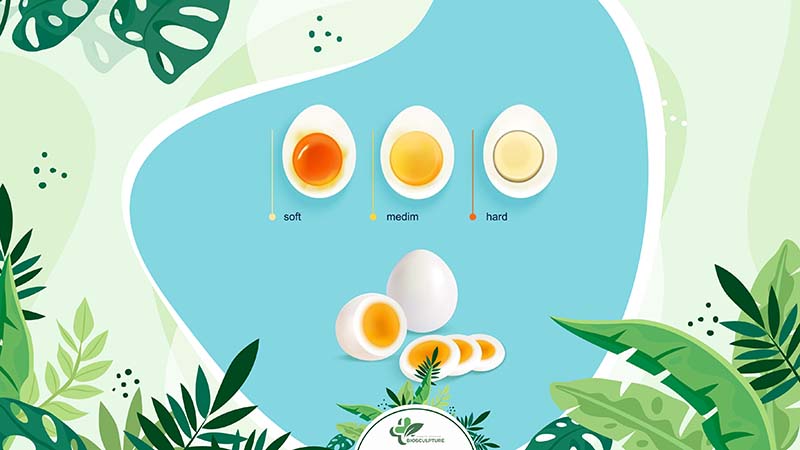The boiled egg diet has become popular as a fast way to lose weight. It involves eating lots of hard-boiled eggs every day, along with lean proteins, veggies, and low-sugar fruits. Some people praise its organized approach and claim it can kickstart weight loss. But when scientists look closely, they find it has drawbacks. The strict rules of the diet make it tough to stick to, and it often doesn’t produce the desired results.
In this article, Biosculpture explores the boiled egg diet, examining whether it lives up to its weight loss promise and how it affects overall health.

1. What Is the Boiled Egg Diet?
The boiled egg diet originates from a book published in 2018 by Arielle Chandler, who doesn’t seem to have credentials as a registered dietitian. The book lays out a structured meal plan, complete with recipes and guidelines on what to eat and avoid.
While there are various versions of this diet, the common thread involves incorporating eggs or another lean protein into every meal, along with non-starchy vegetables and one to two servings of low-carb fruits daily. The author suggests that due to the diet’s low carbohydrate and calorie content, adherents can shed up to 25 pounds (11 kg) in just two weeks.
Supporters also argue that the diet provides essential nutrients that can enhance blood sugar control, promote healthy vision, and fortify bones, hair, and nails. However, these assertions lack scientific backing.

2. How Does the Boiled Egg Diet Work?
The Boiled Egg Diet is a weight loss strategy centered around incorporating eggs into at least one meal daily. This approach emphasizes low carbohydrate intake and high protein consumption, aiming to facilitate rapid fat loss. Several variations of the egg diet exist, such as the 14-day egg diet, egg and grapefruit diet, egg fast diet, and egg-only diet. These plans typically advocate for three meals a day without snacks and eliminating sugary beverages from the diet.
While the egg diet may result in short-term weight loss due to its low-calorie and low-carb characteristics, experts advise caution regarding its long-term sustainability for most individuals. Moreover, those with a history of disordered eating or predisposition to eating disorders should approach this diet with caution due to its restrictive nature.
3. Benefits of the Boiled Egg Diet
The boiled egg diet promotes the consumption of several nutritious foods, including lean proteins, eggs, fruits, and vegetables. These foods are packed with essential vitamins, minerals, and antioxidants crucial for maintaining good health. Additionally, the diet discourages the intake of less nutritious options like sugar-sweetened beverages and many processed foods.
Sugar-sweetened beverages, besides being high in calories, carbs, and added sugar, have been linked to various health issues such as cavities, high blood pressure, inflammation, and insulin resistance, according to studies. Moreover, research indicates that diets rich in processed foods may increase the risk of obesity, heart disease, and cancer.
However, despite these potential benefits, the boiled egg diet comes with significant drawbacks. It may not be sustainable in the long run, and its restrictive nature can make it challenging to adhere to. Instead, individuals can achieve similar health benefits by incorporating the same nutritious foods and limiting less healthy options within a more balanced and sustainable eating pattern.

4. Drawbacks of the Boiled Egg Diet
The boiled egg diet imposes significant restrictions, offering minimal variety by permitting only a handful of specific foods while eliminating entire food groups. This limited diversity not only makes the diet challenging to sustain long-term but also hampers meeting nutritional requirements. Due to the narrow range of allowed foods, the risk of nutrient deficiencies escalates, particularly with prolonged adherence to the diet.
For instance, whole grains provide essential fiber, vitamins, and minerals, while starchy vegetables like potatoes are rich sources of vital nutrients such as vitamin C, potassium, and magnesium—both of which are excluded from the diet.
Moreover, with each egg providing only about 72 calories, a diet centered solely around eggs may fail to provide adequate energy overall, which could be insufficient for most individuals.
Although following the boiled egg diet for the recommended timeframe of two weeks may not likely result in nutrient deficiencies, prolonged calorie restriction poses serious risks to health. Such extended restriction can lead to adverse effects, including low energy levels, weakened immune function, decreased bone density, menstrual irregularities, and more.
Furthermore, the boiled egg diet may foster unhealthy eating patterns and strained relationships with food by eliminating entire food groups and severely restricting intake.
5. What to Eat and Avoid on the Boiled Egg Diet
According to Chandler’s book, the boiled egg diet recommends the following foods:
- Eggs
- Skinless poultry
- Fish
- Lean beef
- Lamb and pork
- Low-carb vegetables, including leafy greens like kale, collard greens, spinach, and mustard greens; zucchini; and bell peppers
- Low-carb fruits, such as tomatoes, oranges, lemons, limes, watermelon, strawberries, cantaloupe, peaches, and grapefruit
- Calorie-free drinks like plain water and sparkling water
- Butter
- Coconut oil
- Mayonnaise
On this eating plan, adherence is strict, with a clear list of foods to consume, and deviation is not permitted.
6. A Sample 7-day Meal Plan for the Boiled Egg Diet
Here’s a sample 7-day meal plan for the boiled egg diet:
Day 1
- Breakfast: Two eggs with spinach and an orange
- Lunch: Grilled salmon served on a salad
- Snack: None
- Dinner: Grilled pork chop with broccoli
- Dessert: None
Day 2
- Breakfast: Two eggs with tomatoes and cantaloupe
- Lunch: Grilled chicken served on a salad
- Snack: None
- Dinner: Ahi tuna with kale
- Dessert: None
Day 3
- Breakfast: Two eggs with an orange
- Lunch: Sliced steak served on a salad
- Snack: None
- Dinner: Baked salmon with mushrooms
- Dessert: None
Day 4
- Breakfast: Two eggs with asparagus and strawberries
- Lunch: Egg salad on lettuce
- Snack: None
- Dinner: Beef roast with cauliflower
- Dessert: None
Day 5
- Breakfast: Two eggs with a slice of ham and strawberries
- Lunch: Baked cod with asparagus
- Snack: None
- Dinner: Grilled chicken skewers with bell peppers and onions
- Dessert: None
Day 6
- Breakfast: Two eggs with cantaloupe
- Lunch: Egg salad on lettuce
- Snack: None
- Dinner: Mahi-mahi with green beans
- Dessert: None
Day 7
- Breakfast: Two eggs with watermelon
- Lunch: Grilled salmon served on a salad
- Snack: None
- Dinner: Pork chop with bok choy
- Dessert: None
7. Conclusion
In summary, the boiled egg diet, with its focus on high-protein and low-carb foods, offers a promising yet strict approach to weight loss and nutritional improvement. By highlighting the benefits of nutrient-rich foods and minimizing processed ones, it aims to support healthier eating habits. Though it may pose challenges for long-term adherence, incorporating aspects of this diet could lead to meaningful health gains.


